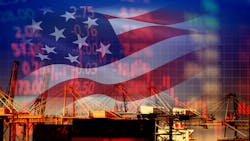Opinion: Bring Essential American Industries Home from China
For decades, the United States has watched China become the world’s workshop as it snatches up industries, jobs, and critical supply chains. It’s time to restructure the global economy in our favor, and that means decisive action to shore up our most important industries.
The COVID-19 pandemic is the straw that broke the camel’s back. From ventilators and personal protective equipment to medicines, we’ve come to learn that China controls the production and distribution of these essential items. Large swaths of our economy are left without an industrial base to ramp up in times of crisis, even when doing so is a matter of life and death. Scrambling to have auto manufacturers produce ventilators during a pandemic has certainly clarified the crisis.
Our mining industry is one of the most important pieces of the industrial supply chain that must be restored to American shores. China’s unrivaled position in mining and mineral supply chains provides an alarming view into how a dominant position in just one strategic industry can become a source of immense economic and geopolitical leverage.
Minerals and metals are the front end of nearly every manufacturing supply chain. From smartphones and computer chips to renewable energy technologies and fighter jets, minerals and metals make these critical technologies possible.
Notably, China controls 90% of the global supply for rare earth elements, which are used across the digital economy in a dizzying variety of military hardware. This wasn’t always the case.
As recently as the 1990s, the U.S. was the world’s largest rare earth producer, boasting unrivaled processing and downstream manufacturing capacity as well. That’s now gone. Today, there is one operating rare earth mine in the U.S.—partially owned by Chinese investors—and its production must be shipped to China for processing.
So concerned is the Department of Defense by China’s control of the rare earth market and our broken supply chain that it is funding the development of a domestic rare earths processing facility. This step, an acknowledgment of our perilous situation, should only be a prelude to the decisive action we need. U.S. mineral import reliance has risen to alarming levels, nearly doubling over the past two decades. We now find ourselves reliant on imports for nearly 50 essential minerals and metals and 100% reliant on imports for 18 of them. China controls the market for a startling number.
This mineral import reliance—something Senator Lisa Murkowski of Alaska has called the nation’s “Achilles’ heel”—isn’t for lack of domestic resources. The U.S. has trillions of dollars in mineral reserves but an adversarial stance towards mining. Our shortsightedness has traded secure domestic production under first-class environmental standards for ever-growing dependence on China and other nations without the labor, safety, or environmental standards firmly in place here.
Cutting red tape at home, reducing mine permitting times, and increasing the competitiveness of our industry are obvious first steps. Providing tax incentives to encourage U.S. manufacturers to use domestically produced materials is a logical follow-up. Employing the Defense Production Act to help reestablish essential production and to create certainty for private investment is well worth consideration.
Admittedly, China isn’t solely to blame for our current highly vulnerable situation. If it could be made for less in China, U.S. industries picked up and left. We knew China was subsidizing its own industries to outcompete ours, and we failed to address the imbalance. But our adherence to the capitalist principle of comparative advantage failed to address competition from China’s command economy. The status quo must not continue.
We can’t afford to wait to reorient our policy and hold China to account. We must bring essential industries back home and reestablish our vital supply chains. The crisis borne from China’s predation and our own neglect is no longer theoretical. It’s past time we act.
Brig. Gen. John Adams (U.S. Army, retired) is the president of Guardian Six LLC based in Gulf Breeze, Florida, and Washington, D.C. Guardian Six is a national security consulting firm advising government, business, and nonprofits. He is the lead author of a 2013 study of the defense industrial base, ‘Remaking American Security,’ published by the Alliance for American Manufacturing.
About the Author
John Adams
Brig. Gen.
Brig. Gen. John Adams (U.S. Army, retired) is the president of Guardian Six LLC based in Gulf Breeze, Florida, and Washington, D.C. Guardian Six is a national security consulting firm advising government, business, and nonprofits. He is the lead author of a 2013 study of the defense industrial base, ‘Remaking American Security,’ published by the Alliance for American Manufacturing.
